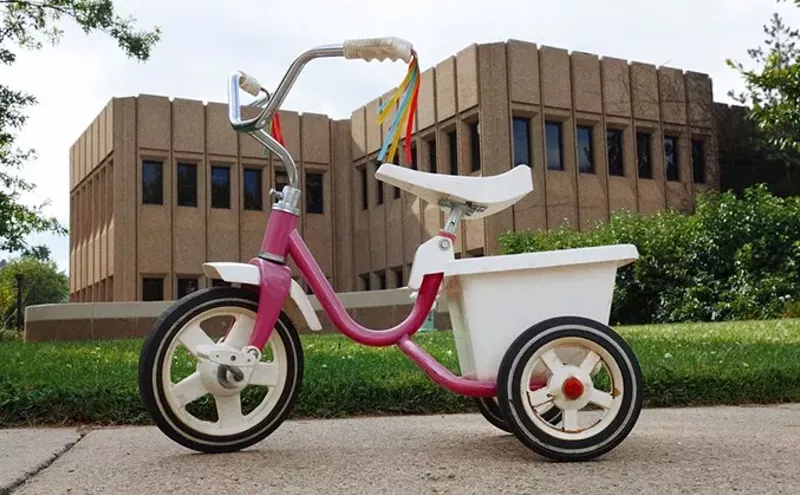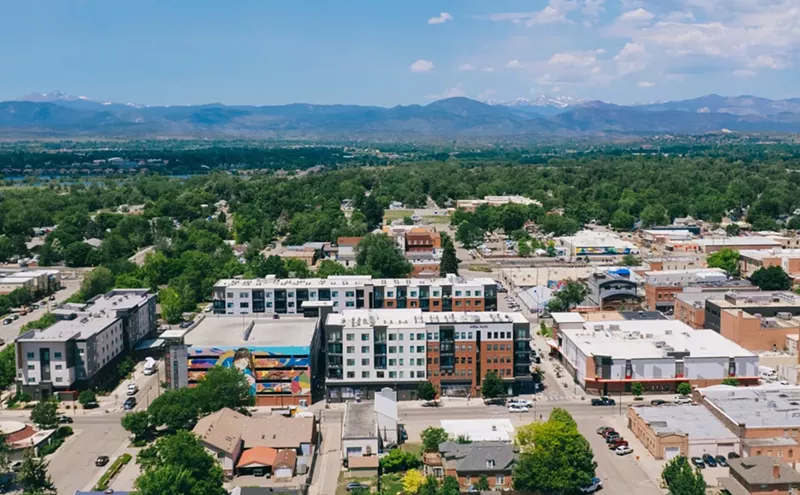Last week, legislators considered a “homeless bill of rights” at the State Capitol, but representatives at a House committee meeting ultimately voted the proposal down five to six. It was a major defeat for homeless activists who were counting on passage of the Right to Rest Act — sponsored by House representatives Joseph Salazar, a Democrat from Thornton, and Jovan Melton, a Democrat from Arapahoe County/Aurora — to outlaw anti-homeless ordinances enacted by local municipalities, such as the urban-camping ban in Denver.
In an interview with Westword, Melton talked about the dirty politics behind the committee hearing and his hope that Colorado will eventually see a homeless bill of rights.
Westword: Last Wednesday, you and Representative Salazar presented the Right to Rest bill before the House Local Government Committee. Can you explain what the bill hoped to accomplish? How did it come to be?
Representative Jovan Melton: The Right to Rest Act came to us through the organization Denver Homeless Out Loud. The aim of the bill was to prevent cities and counties from enacting ordinances that hurt homeless individuals. This includes things like not being able to sleep outside through Denver’s urban-camping ban and not being able to rest on sidewalks, like what’s happened with one of Colorado Springs’s recent ordinances. These ordinances hurt more than they help. They create a criminal record for people who really have no other place to go, who are already facing challenges in finding employment or getting themselves back on their feet. So the bill aimed to remove those obstacles and say, as a state, that we weren’t going to allow more cities to enact them.
Can you explain why you believe this is a state issue and not something that should be left to local municipalities?
It’s a state issue because one city’s ordinances can end up affecting many more communities. For instance, when Denver passes an ordinance that criminalizes homelessness, what happens is that people who are homeless say, “Okay, if I’m going to get cited in the city of Denver, then I’ll go to Aurora or Arvada instead.” And a lot of times, those communities don’t have the same resources that the city of Denver does. In Aurora, there are only two homeless shelters. But there have been increasing numbers of homeless coming into that city without the resources to help them. And Aurora voters can’t do anything about how Denver passes their ordinances. That’s when it becomes a state issue.
The bill was voted down three to eight in committee last year. What changes did you make before your second attempt last week?
This was a much different bill than last year’s. The biggest change was with “private right of action.” Last year’s bill allowed a [homeless] individual to sue a private company or individual for being forced off their property. What we did [this year] was take a step back from that and decided just to deal with the municipalities. This helped bring some of the business community along as well as private interests, where they were opposed to last year’s bill.
Additionally, were you hoping the brief filed by the Department of Justice last August that says that it is unconstitutional to ban homeless from sleeping outside, as well as the DU study released this month that calculated the costs of criminalizing homelessness in Colorado, would both help sway the vote in your favor this time?
Definitely. We're seeing that the Department of Justice is cracking down on cities that are doing this. We were hoping that the findings from the DOJ [about the camping ban in Boise, Idaho] would have helped us.
The DU study was also really eye-opening – that Denver is spending $3.2 million dollars [over five years] to enforce [anti-homeless] ordinances as opposed to using those funds to help the homeless, which would be a far better use of the money.
In Salazar’s opening statement at the committee hearing, he said, “There have been some in the House of Representatives that have made fun of this bill.” Can you expand on what he was referring to?
[Representative Salazar and I] have had people come over with blankets and pillows to our offices and joke, “Is this a place where I can rest?” This isn’t a light issue; the [homeless] are people who are really struggling.
We even saw [that attitude] during the committee hearing with Representative [Lori] Saine’s amendment. [Her amendment], which was defeated, would have added the legislative offices to the list of places where a person could rest. Of course, my office was already covered in the bill, because the Capitol building is owned by the public. But [for Saine] to try and spell it out that way was another assault on the bill and making light of the issue.
So Representative Saine’s amendment was to add your office to the bill to see if you were serious about the homeless being able to rest or sleep anywhere in public spaces?
Yeah.
And that was the only substance of that amendment?
That was the only thing her amendment did. Again, she was, I think, trying to make light of the issue. Even though she said it was a serious amendment, experiencing some of the jokes by their side [like bringing pillows and blankets to my office] before the bill was introduced, it’s my opinion that she was trying to make light of a very serious issue.
What was the reaction when she introduced the amendment at the committee hearing?
Both Representative Salazar and I condemned the amendment and said that it was hostile to the intent of the bill. We had fifty people there in support and to talk about their experiences being homeless and having to deal with law enforcement. So to hear all of their testimony and still bring this type of amendment to the discussion was ill-timed and inappropriate.
What amendments passed?
One was to exempt higher-education buildings after business hours because some are paid for with student fees. The other thing we did was pass an amendment that said that if a city can provide an alternative to an ordinance — give a voucher, give adequate housing — then it can keep that ordinance. So basically it’s like “Give a voucher before a ticket” type of amendment. We hoped that would have brought the other committee members on board, because then we were keeping local control in play but were giving an alternative for those experiencing homelessness.
Do you think the bill could have passed the House had it made it to the floor? What about the Republican-controlled Senate?
I think it could have passed the House. In committee, one Republican did vote for the bill: Representative Klingenschmitt. He looked at it as both a civil-liberties issue — that this is big government telling people where they can’t be — and a religious issue. We heard from clergy members that [anti-homeless ordinances] go against most of their teachings within their faith. So I think we would’ve gotten through the House just fine with bipartisan support.
And I honestly think we would have gotten through the Senate, as well. Even though it’s controlled by Republicans, there is a strong civil-liberty argument to this.
During the hearing, Meghan Dollar of the Colorado Municipal League criticized the Right to Rest Act by saying, “There’s nothing in this bill that will end the cycle of homelessness.” What do you make of her characterization?
I understand the bill doesn’t provide new funding or resources toward ending the cycle of homelessness, but it did help in that it ended the practice of criminalizing it. When we see cities that have ordinances that give people criminal records, that’s [a problem]. We had someone there who is homeless and moved here from Dallas, and he said he never had a criminal record until he got [to Colorado] and was cited for sleeping outside.
At the end of the seven-hour hearing, the bill was voted down by a one-vote margin. Was that surprising, or had you steeled yourself for that result by that point?
It was surprising. I thought that the amendments that were adopted would have gotten some members to a yes vote. Namely, Representative Arndt, who was coming from Fort Collins, because the amendment that said “Give a voucher before you give a ticket” was based on Fort Collins’s model — what they’re already doing.
What are your plans moving forward? Will you try to introduce the bill again next year?
I need to discuss it with the stakeholders first. If they decide they want to try again, I’m more than willing to.... I think we’re getting somewhere by having these conversations, and I don’t want to just drop it off here. I want to see if we can get this bill to a point where it will pass and actually start helping people.

Audio By Carbonatix
[
{
"name": "GPT - Billboard - Slot Inline - Content - Labeled - No Desktop",
"component": "23668565",
"insertPoint": "2",
"requiredCountToDisplay": "2"
},{
"name": "STN Player - Float - Mobile Only ",
"component": "23853568",
"insertPoint": "2",
"requiredCountToDisplay": "2"
},{
"name": "Editor Picks",
"component": "17242653",
"insertPoint": "4",
"requiredCountToDisplay": "1"
},{
"name": "Inline Links",
"component": "18838239",
"insertPoint": "8th",
"startingPoint": 8,
"requiredCountToDisplay": "7",
"maxInsertions": 25
},{
"name": "GPT - 2x Rectangles Desktop, Tower on Mobile - Labeled",
"component": "24956856",
"insertPoint": "8th",
"startingPoint": 8,
"requiredCountToDisplay": "7",
"maxInsertions": 25
},{
"name": "Inline Links",
"component": "18838239",
"insertPoint": "8th",
"startingPoint": 12,
"requiredCountToDisplay": "11",
"maxInsertions": 25
},{
"name": "GPT - Leaderboard to Tower - Slot Auto-select - Labeled",
"component": "17676724",
"insertPoint": "8th",
"startingPoint": 12,
"requiredCountToDisplay": "11",
"maxInsertions": 25
}
]











